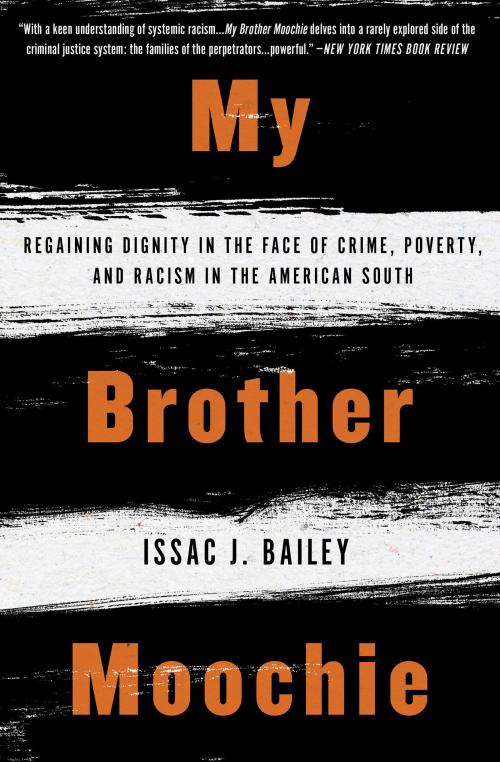“With a keen understanding of systemic racism…My Brother Moochie delves into a rarely explored side of the criminal justice system: the families of the perpetrators…powerful.” —New York Times Book Review
“Bailey’s memoir is a triumph, a painful indictment of American inhumanity woven with threads of grace and love…an extraordinary book about crime, punishment, redemption, and the empowerment that can spring from adversity…nuanced, original, and remarkably clear-sighted.” —The Guardian
“An elegant memoir that speaks to the inequities of the criminal justice system and the damage done to family and community when loved ones are locked away…Bailey tells his story with a raw honesty [and] boldly examines the fault lines etched so sharply in our current cultural landscape.” —USA Today
“[A] beautifully written book. Its author will inevitably be compared with Ta-Nehisi Coates, recently hailed as the essential voice of black America. But Mr. Bailey’s writing has much more concrete detail on lives lived one misjudgment away from prison.” —The Economist
“A raw exploration of [Bailey’s] relationship to his brother and incarceration writ large, as well as an analysis of the factors that entrap young black men in the South in the criminal justice system.” —Electric Literature, A Reading List for Understanding the Prison Industrial Complex
“Deeply moving and powerfully written…[Bailey’s] unflinching account of his brother’s suffering is paired with reflections on community, race relations, and the impacts of poverty, crime, and shame.” —Booklist (starred review)
“Bailey refuses to make things easy for either his readers or himself; he avoids pat analysis of the scourge of racism and never settles for simple answers…There’s a catharsis for all by the end but no smooth path or easy arrival.” —Kirkus Reviews
“Eye-opening…My Brother Moochie represents a much larger story about the deeply rooted effects of systematic racism, the Jim Crow South and how race, poverty, violence, crime, opportunity and drug abuse intersect.” —Ebony
“Bailey has a relatable, multifaceted story to tell…compelling.” —Minneapolis Star Tribune
“Searing honesty—this is what most strikes me about Issac Bailey’s brave narrative. In paying tribute to fierce, at times despairing filial and familial love, he holds a mirror to the reader, daring any of us to deny the most self-evident of truths: human beings are deeply flawed and all of us are more than the worst thing we’ve ever done.” —Carol E. Quillen, President, Davidson College
“Issac Bailey’s book is one part call to action and another part mirror. A powerful reminder that we are given our skin and genetic fingerprint by nothing short of a lottery, but how we stand in it is often a product of how the world sees or doesn’t see us. My Brother Moochie should be on the desk of every schoolteacher, student, and policymaker in this country.” —Jennifer Thompson, Founder/President of Healing Justice and coauthor of Picking Cotton: Our Memoir of Injustice and Redemption
“In page-turning prose, Bailey explores the self-hatred engendered in him, his immediate family, and his broader communities, by the intersecting oppressions of racism, poverty, violence, and physical disability. But this is also a story of redemption. My Brother Moochie is, in fact, two eloquently interwoven coming-of-age stories: the author’s own story of growing up, silenced by a debilitating stutter but free to roam the streets of his neighborhood, and ultimately his country; and Moochie’s story of growing up, loudly speaking his truth, but only from within the cinderblock confinement of prison walls. The result is a read simultaneously heartbreaking and heartwarming.” —Keramet Reiter, author of 23/7: Pelican Bay Prison and the Rise of Long-Term Solitary Confinement

